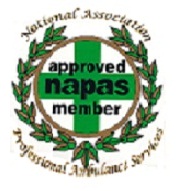NAPAS Member service staff are normally trained through external training providers (other than for induction training). All courses are prior approved, so that they meet with Nationally accepted equivalent levels of training for Ambulance and Extended Ambulance Aid competency. Additional PHTLS - ATLS
- BASICS training is encouraged.
NAPAS Professional further encourages the development of life-long
learning, and during the past year have been engaged on a number of projects to
develop this both on line and through already developed programmes. NAPAS are
continuing to develop through the Association of European Ambulances (AEA) a
European Core Standard for Ambulance Technicians, as this develops we continue
to encourage all Ambulance Technicians to engage in some of the recommended
existing online educational link programmes, further links are being developed
and will be added as time progresses.
NAPAS Educational Links
Welcome to the NAPAS Professional Staff Educational Links
try out these varied links print off the results and add them to your portfolio.
Your personal NAPAS Portfolio can be printed off here.
Personal Portfolio.
and
Training and experience record
click here for Free
EMT Zone Anatomy Review this is an external link and to
return use your back browser
This is an interactive site covering the human anatomy
from head to toe. The exercise area is about placing the correct parts of the
body in the right places, it is a pass or fail exercise with instant results,
and you can retry as many times as required. This is excellent on line testing
for all grades for continuing credits
(We suggest that you print off the results when all
correct and add them to your portfolio)
internal site links to educational links
SKILL EVALUATION
SHEETS FOR EMPLOYERS
As with all educational programmes employers should
undertake continued assessment of skills, these skill evaluation sheets are
designed to be completed by the employer (Evaluator) and can then be added to
the students portfolio as evidence of ongoing continued professional
development.
Assessments and Emergency Care training sheets
Soft Tissue Injuries
Welcome to Trans-Ambulance M00
Cardiovascular Emergencies
The following are Links to Trans-Ambulance Site
Diabetic Emergencies
Driving & Road Safety MO1 (1)
Gastrointestinal & Urologic Emergencies Safe Working Environment MO2 (1)
Gynaecologic Emergencies Safe Working Environment MO2 (3)
Immunologic Emergencies
Safe Working Environment MO2 (4)
Internal & External Bleeding
Safe Working Environment MO2 (5)
Neurological Emergencies
Safe Working Environment MO2 (6)
Psychiatric Emergencies
Basic Life Support MO3 (1)
Respiratory Emergencies
Transporting Patients to Proper Health Facilities MO4 (1)
Toxicology Emergencies
Basic Life Support MO5 (1)
Abdominal Injuries
Basic Life Support MO5 (2)
Treatment of Shock
Psychological & Social Support MO6 (1)
Orthopaedic Injuries
Psychological & Social Support MO6 (2)
Chest Injuries
Psychological & Social Support MO6 (3)
Head & Spine Injuries
Advanced Life Support MO7 (1)
Face & Neck Injuries
Ebola Advice Spanish Government
Environmental Emergencies
Ebola Advice English Translation (see above)
Obstetric Emergencies & Neonates
Paediatric Emergencies
Geriatric Emergencies
Ambulance Law
Revised 2015
Bomb Blast
Curriculum.
Bombings (requires Power Point)
Medical Device Advisory Instructions
Employment Law Legalisation
Legal Status Attempting Resuscitation
Lucas Chest Compression System.
Short History of Stretchers
